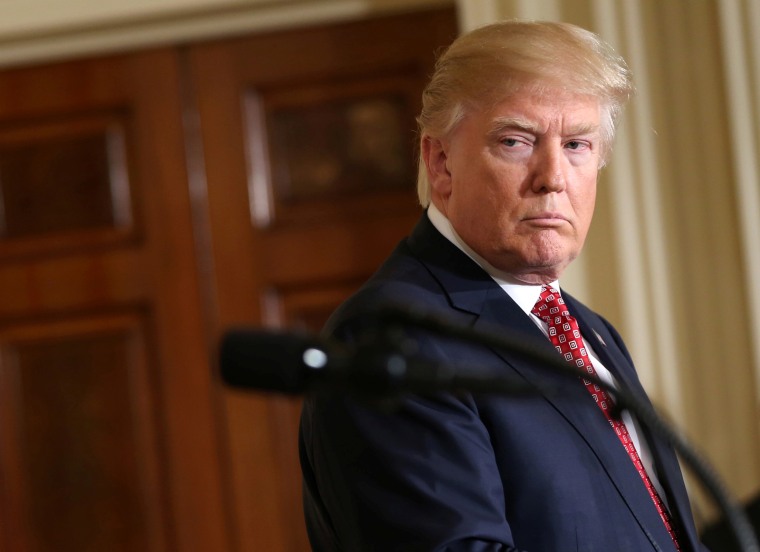At a brief White House press conference today, standing alongside Israeli Prime Minister Benjamin Netanyahu, Donald Trump fielded a question from an Israeli journalist who asked about a rise in anti-Semitic incidents. "I wonder what you say to those among the Jewish community in the States, and in Israel, and maybe around the world who believe and feel that your administration is playing with xenophobia and maybe racist tones," the reporter asked.The American president's reaction was .... unexpected.
"Well, I just want to say that we are, you know, very honored by the victory that we had -- 306 electoral college votes. We were not supposed to crack 220. You know that, right? There was no way to 221, but then they said there's no way to 270. And there's tremendous enthusiasm out there."
Trump went on to say national divisions contributed to his victory, and then pointed to Jewish members of his family.In other words, asked about anti-Semitic incidents, Donald Trump immediately thought of how cool it was that he won the presidential election.This followed a press conference on Monday with Canadian Prime Minister Justin Trudeau in which Trump, in response to a question about Syrian refugees, noted that he won "a very, very large electoral college vote."This, of course, came on the heels of a series of bizarre claims in which Trump claimed to have secretly won the popular vote, a recent interview in which he described his 2016 win as "one of the greatest victories ever," and a recent conversation between the president and the Australian prime minister in which Trump reportedly "boasted about the magnitude of his electoral college win."Part of the problem with Trump's unhealthy preoccupation is that it's factually incorrect. He earned 306 electoral votes, and he received 304. Neither number is especially impressive: Trump's tally was well below the historical average, and ranks among the lowest in American campaign history.But even if we put aside pesky details and facts the White House finds annoying, the president's near-constant references to his election -- sounding a bit like a grown man who can't stop talking about the time he won the big game in high school -- aren't doing him any favors.Look, I realize this guy's insecure. I can appreciate the fact that Trump lost the popular vote by nearly 3 million votes, which raises questions about his presidency's legitimacy for which there is no easy answer. But does the president not realize he's making matters worse?George W. Bush, at this point 16 years ago, faced similar circumstances. He was a Republican president, who lost the popular vote, and who needed controversial outside assistance to put him in the Oval Office (in Bush's case, it was the Supreme Court, not Russia and James Comey).At the time, Bush responded to questions about his legitimacy by ignoring the 2000 election as much as humanly possible. He was desperate to look forward, not back, knowing that the more he dwelled on his controversial election from months earlier, the smaller and weaker it would make him appear. All he would do was remind the public that when the nation had a choice, he came in second, but he took office anyway.With Trump, it's the exact opposite: he seems to believe he can overcome questions about his legitimacy through sheer force of will -- as if Americans will start respecting him more if he badgers them into thinking his election was impressive.It's a poor plan, being executed in an embarrassing way.
